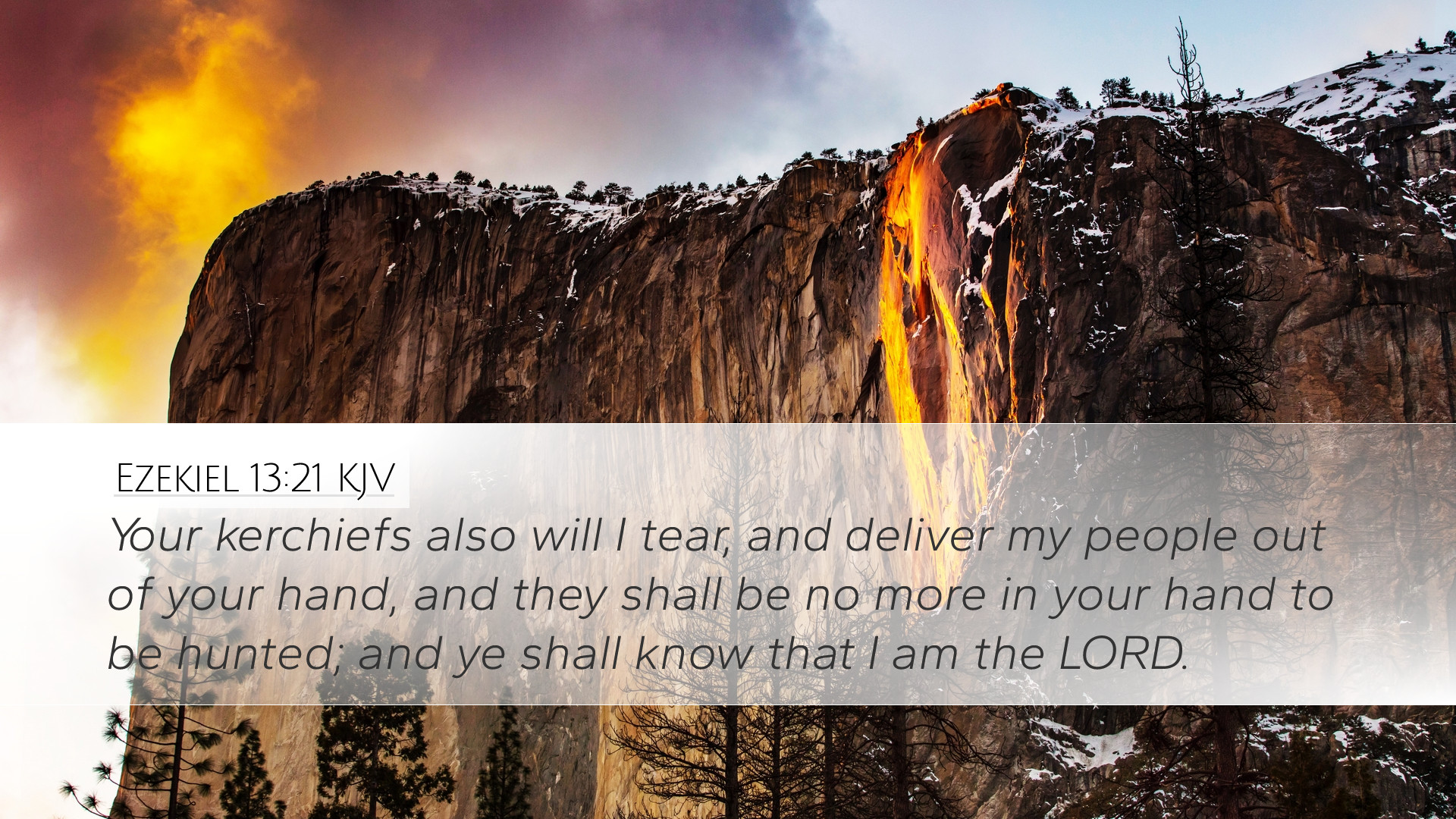Bible Commentary on Ezekiel 13:21
Ezekiel 13:21 (KJV): "Your kerchiefs also will I tear, and deliver my people out of your hand, and they shall be no more in your hand to be hunted; and ye shall know that I am the LORD."
Introduction
This verse is a part of the oracle against the false prophets in the book of Ezekiel. In this context, God through Ezekiel expresses His disdain for those who deceive His people. The prophetic message reveals God’s determination to rescue His people from the oppressive influence of false teaching and manipulation.
Commentary Insights
1. The Role of False Prophets
Albert Barnes notes that the "kerchiefs" mentioned in this verse symbolize the false hopes that prophets provide to the people. These prophets craftily conceal the true state of Israel’s spiritual condition under the guise of comfort and safety.
They would use these kerchiefs as a means to attract and maintain followers, yet they only led the people further away from the truth of God. The act of tearing these kerchiefs represents God's rejection of their false assurances.
2. Divine Deliverance
Matthew Henry emphasizes the deliverance aspect of this verse, explaining that God is committed to liberating His people from the grasp of deceitful leaders. The phrase "I will deliver my people out of your hand" speaks to God's protective nature and His authority to rescue those who are being led astray.
This deliverance is both physical and spiritual, a restoration to the true worship of the Lord, breaking the chains of erroneous doctrine and practice. Henry elaborates on God’s desire for His people to know Him, stating that recognition of God’s sovereignty is a fundamental aspect of faith and spiritual health.
3. Knowing the Lord
The concluding phrase "and ye shall know that I am the LORD" signifies a pivotal moment of revelation. Adam Clarke identifies this knowledge as a transformative realization. It's not merely intellectual acknowledgment but an experiential understanding of God's character and His involvement in the lives of His people.
This knowledge is based on witnessing God's mighty acts of deliverance. It implies a relationship with God that is restored and deepened through His actions. Clarke suggests that knowing God is the antidote to the deceptions promulgated by false prophets, leading the faithful to discern truth from falsehood.
4. Consequences of Deceit
Warnings Against False Leadership: The implications of this verse serve as a significant warning for leaders within the church today. Both Henry and Barnes urge contemporary ministers to be vigilant against false teaching. The accountability of those who teach is a theme that resonates throughout Scripture, and leaders must not misrepresent God's truth.
- Spiritual Accountability: The weight of accountability falls upon the shoulders of those who lead. They must seek to declare the truth of God unashamedly.
- Discernment: The body of Christ is called to exercise discernment, testing the spirits to ensure that what is being preached aligns with the core teachings of Scripture.
- The Prophetic Role: Understanding the prophetic voice of the modern church is crucial; it must reflect the heart of God and challenge the status quo of false narratives.
Applications for Today's Church
This verse from Ezekiel invites pastors, theologians, and students to reflect on several applications:
-
Authenticity in Preaching: Like Ezekiel's audience, the contemporary church must confront the realities of falsehood within its midst. Authentic preaching grounded in Scripture is necessary for spiritual health.
-
Encouragement to the Oppressed: God promises deliverance, which serves as a reminder for church leaders to be vessels of hope and strength to those struggling under the weight of deceit or despair.
-
Vision of God’s Sovereignty: Encouraging the congregation to recognize God’s sovereignty in their lives helps them to cultivate a deeper relationship with Him, knowing that He is always in control, even in tumultuous times.
-
Community Responsibility: There is a communal aspect to maintaining doctrinal integrity. The church must come together to ensure the purity of teaching and hold one another accountable in love.
Conclusion
The powerful affirmation in Ezekiel 13:21 serves as a significant reminder of God's active role as the protector and deliverer of His people. It speaks against the backdrop of falsehood and emphasizes the necessity for true leadership that reflects God’s heart for His people. In an era rife with deceptive teachings and distractions, both the historical context and contemporary application of this verse urge the church to seek the Lord genuinely and uphold the truth of His Word amidst adversity.


